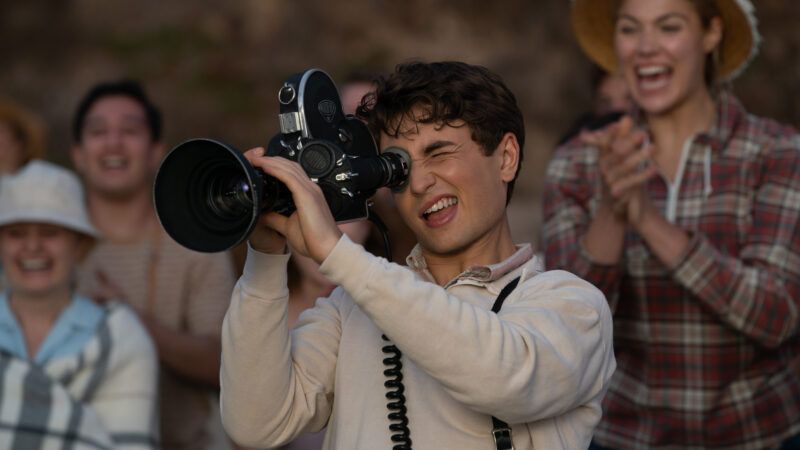Review: The Fabelmans
Past imperfect.

A Steven Spielberg movie about his childhood back in the 1950s sounds like a ticket to a cotton-candy apocalypse. But The Fabelmans, while certainly sweet, is never sugary. It glimmers with Spielbergian signifiers—spunky kids, twinkly Christmas lights, cozy suburban homes. Beneath the fairyland glow, however, darker forces are at work—betrayal, despair, heartbreak, and death. The movie is a very grown-up mix of joys and sorrows, and it's deeply engaging.
Spielberg's great achievement here is managing to present a full account of his late parents, Leah and Arnold, with all of their foibles and defects, and to embrace them. His family is now called the Fabelmans—mom is Mitzi, dad is Burt—and they're played, to virtual perfection, by Michelle Williams and Paul Dano. The young Spielberg is represented by Sammy Fabelman (played at first by Mateo Zoryon Francis-DeFord, later by Gabriel LaBelle). There are also three lively younger sisters, a grumpy grandmother, and a colorful uncle named Boris (played so broadly by Judd Hirsch that you marvel there's room for anyone else on screen whenever he's up there).
As the Fabelmans' story gathers grip, we also observe Sammy's blossoming love of movies. The picture begins in 1952, with the boy and his parents sitting in a theatre watching a Cecil B. DeMille circus epic, The Greatest Show on Earth—Sammy's first cinematic experience. The film contains a spectacular train-wreck scene that Sammy later recreates using a toy train set and his father's 8mm home-movie camera. Over time, with Burt's financial help, he eventually moves up to a pricier Bolex camera and a small editing table, and before long he is recruiting school friends to help him shoot his own westerns and war films. ("You ever gonna make a movie with parts for girls?" asks one of his sisters.)
Meanwhile, a mysterious cloud has formed over the Fabelmans' marriage. Burt, an electrical engineer and computer savant, is completely caught up in his work and thinks nothing of repeatedly uprooting his family to accept employment offers in places like Phoenix and northern California—places with not a lot of fellow Jews, but (as Sammy discovers) more than a few Jew-haters. Mitzi, who was once intent on a career as a concert pianist, has stowed her dreams in order to raise a family and to follow Burt in his travels around the country, on which he's sometimes joined by another engineer, his friend Bennie Loewy (Seth Rogen). Mitzi never complains about where life has taken her, but she's unhappy. Burt, a gentle, recessive soul, is clueless. "Something's not right," he says. "You're behaving like you're in mourning, but nobody died." (The movie's skillfully wrought dialogue is the work of Spielberg and cowriter Tony Kushner, in their fourth scripting collaboration.)
Mitzi also has a sunny, manic side, and Williams captures that, too. Her character is the kind of mom who'll impulsively pile her kids into a car and take off in dangerous pursuit of a passing tornado. ("Of course it's safe," she says, "I'm your mother.") But Williams' emotional precision in conveying Mitzi's inner torment is breathtaking, especially in a scene in which she and her husband are caught up in a rare, angry argument (and even more so when Sammy discovers what's really eating away at her—a revelation that sets the movie off on a new trajectory).
While his parents' marriage appears to be crumbling, Sammy finds himself drawn to a high school classmate named Monica (Chloe East), whose flirty, first-girlfriend vibe lights up the second half of the picture. Monica is a devout Christian (one of her bedroom walls is thick with pictures of Jesus, interspersed with headshots of period pop idols like Fabian and Frankie Avalon), but she's open-minded. To Sammy, who doesn't grasp the Jesus thing, she says, "Maybe you can ask him to come into your heart, see what happens." It's a measure of Spielberg's knowing affection for this early '60s period that he stages a subsequent teenage beach revel as an echo of the old Beach Party movies (complete with the sound of a hit single by singer James Darren, who appeared in the surfy Gidget films).
Resonant teen-pop is sprinkled throughout the movie—period tracks by Link Wray, Jimmy Soul, and the Chiffons—which anchors the film in a particular, pre-hippie time. The picture also features an annoying monkey, a pack of obnoxious jocks, some cute little in-jokes, and an appearance by "the greatest director who ever lived" (played, not inappropriately, by David Lynch). Also included: a warm, beating heart.

Show Comments (9)